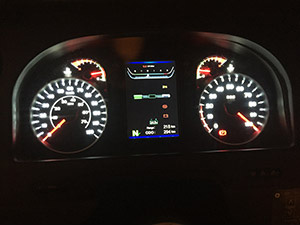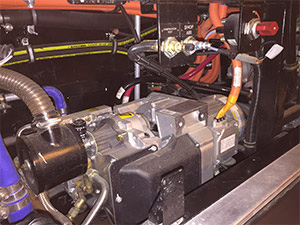
About the Technology
Environmentally Friendly Transit
- Battery-powered and capable of extended periods of operation, making multiple trips without recharging.
- Recharging will take place during periods of lower demand electricity usage (late evening or night time).
- Reduction in operational costs and greenhouse gas emissions.
- Quiet operation, reducing noise pollution.

The Driver's View

The Engine Compartment
Interesting Facts
- Electric buses cost approximately $0.09 per kilometer for fuel. Diesel buses cost approximately $0.45 per kilometer.
- The electric buses have been outfitted with air conditioning. All future StAT bus purchases will include air conditioning units.
- The longest distance travelled to date on one charge is 284 kilometers.
- The longest time span an electric bus has operated on a single charge is 10 hours.
- Electric buses are averaging 170 kilometers per day.
- Total battery capacity is 270 kilowatt hours.
- Battery capacity for a Chevrolet Volt is 18.4 kilowatt hours, Nissan Leaf 30 kilowatt hours, Ford Focus 23 kilowatt hours.
- Charging takes, on average, less than 3 hours.
Related Pages
Last edited: November 18, 2019





